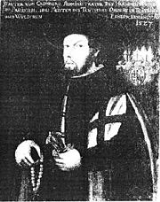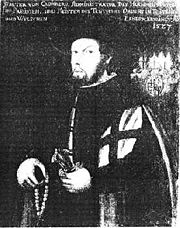
Walter von Cronberg
Encyclopedia

Biography
Von Cronberg hailed from a rather poor family of knights from Kronberg CastleKronberg im Taunus
Kronberg im Taunus is a town in the Hochtaunuskreis district, Hesse, Germany. Before 1866, it was in the Duchy of Nassau; in that year the whole Duchy was absorbed into Prussia. Kronberg lies at the foot of the Taunus, flanked in the north and southwest by forests...
near Frankfurt
Frankfurt
Frankfurt am Main , commonly known simply as Frankfurt, is the largest city in the German state of Hesse and the fifth-largest city in Germany, with a 2010 population of 688,249. The urban area had an estimated population of 2,300,000 in 2010...
. He joined the Teutonic Order in 1497 and held the post of a tax collector in the Komturei of Mergentheim
Bad Mergentheim
Bad Mergentheim is a town in the Main-Tauber district in the German state of Baden-Württemberg.-History:Mergentheim is mentioned in chronicles as early as 1058, as the residence of the family of the counts of Hohenlohe, who early in the 13th century assigned the greater part of their estates in...
from 1499. He became the Komtur of Frankfurt in 1504. During the times of his predecessor Albert of Brandenburg-Ansbach
Albert I, Duke of Prussia
Albert of Prussia was the 37th Grand Master of the Teutonic Knights and, after converting to Lutheranism, the first duke of the Duchy of Prussia, which was the first state to adopt the Lutheran faith and Protestantism as the official state religion...
, von Cronberg was the legate
Papal legate
A papal legate – from the Latin, authentic Roman title Legatus – is a personal representative of the pope to foreign nations, or to some part of the Catholic Church. He is empowered on matters of Catholic Faith and for the settlement of ecclesiastical matters....
to King Sigismund I the Old
Sigismund I the Old
Sigismund I of Poland , of the Jagiellon dynasty, reigned as King of Poland and also as the Grand Duke of Lithuania from 1506 until 1548...
of Poland. In 1517 he founded the Brotherhood of St. Sebastian and in 1526 he was chosen Deutschmeister, the Master of the German
Germany
Germany , officially the Federal Republic of Germany , is a federal parliamentary republic in Europe. The country consists of 16 states while the capital and largest city is Berlin. Germany covers an area of 357,021 km2 and has a largely temperate seasonal climate...
branch of the Order.
In 1525, when Albert had converted to Lutheranism
Lutheranism
Lutheranism is a major branch of Western Christianity that identifies with the theology of Martin Luther, a German reformer. Luther's efforts to reform the theology and practice of the church launched the Protestant Reformation...
and was excommunicated
Excommunication
Excommunication is a religious censure used to deprive, suspend or limit membership in a religious community. The word means putting [someone] out of communion. In some religions, excommunication includes spiritual condemnation of the member or group...
, von Cronberg declared himself the next Grand Master. His claim was based on a statute
Statute
A statute is a formal written enactment of a legislative authority that governs a state, city, or county. Typically, statutes command or prohibit something, or declare policy. The word is often used to distinguish law made by legislative bodies from case law, decided by courts, and regulations...
of Werner von Orseln
Werner von Orseln
Werner von Orseln was the 17th Grand Master of the Teutonic Order, serving from 1324 to 1330.Von Orseln hailed from a noble family of vogts of the Counts of Falkenstein in Oberursel near Frankfurt. It is not known when he joined the Teutonic Order...
from the 14th century which stated that in the case of the absence of the Grand Master, the Master of one of the other branches of the Order would resume the position.
However, this decision was met with some resistance from the Master of the Livonian branch
Livonian Order
The Livonian Order was an autonomous Livonian branch of the Teutonic Order and a member of the Livonian Confederation from 1435–1561. After being defeated by Samogitians in the 1236 Battle of Schaulen , the remnants of the Livonian Brothers of the Sword were incorporated into the Teutonic Knights...
, Wolter von Plettenberg
Wolter von Plettenberg
Wolter von Plettenberg was the Master of the Livonian Order from 1494 to 1535 and one of the greatest leaders of the Teutonic knights. He was an important early Baltic German....
, who also laid a claim to this function. The conflict was averted by Emperor Charles V
Charles V, Holy Roman Emperor
Charles V was ruler of the Holy Roman Empire from 1519 and, as Charles I, of the Spanish Empire from 1516 until his voluntary retirement and abdication in favor of his younger brother Ferdinand I and his son Philip II in 1556.As...
who settled the matter in 1527 in favour of von Cronberg, declaring him "Administrator of the Office of Grand Master". Also, the claim of the Grand Master to Albert's Duchy of Prussia was renewed. As no control could be exercised there, the Grand Master's seat was moved from Königsberg
Königsberg
Königsberg was the capital of East Prussia from the Late Middle Ages until 1945 as well as the northernmost and easternmost German city with 286,666 inhabitants . Due to the multicultural society in and around the city, there are several local names for it...
to the seat of the Deutschmeister in southern Germany, Mergentheim
Bad Mergentheim
Bad Mergentheim is a town in the Main-Tauber district in the German state of Baden-Württemberg.-History:Mergentheim is mentioned in chronicles as early as 1058, as the residence of the family of the counts of Hohenlohe, who early in the 13th century assigned the greater part of their estates in...
near Würzburg
Würzburg
Würzburg is a city in the region of Franconia which lies in the northern tip of Bavaria, Germany. Located at the Main River, it is the capital of the Regierungsbezirk Lower Franconia. The regional dialect is Franconian....
.
From 1530, von Cronberg dedicated himself to save the Catholic character of the Order. He was unsuccessful, however, in preventing further secularization
Secularization
Secularization is the transformation of a society from close identification with religious values and institutions toward non-religious values and secular institutions...
of the Teutonic Order in the Holy Roman Empire
Holy Roman Empire
The Holy Roman Empire was a realm that existed from 962 to 1806 in Central Europe.It was ruled by the Holy Roman Emperor. Its character changed during the Middle Ages and the Early Modern period, when the power of the emperor gradually weakened in favour of the princes...
, with increasingly more knights breaking the oath by conversion to Protestantism
Protestantism
Protestantism is one of the three major groupings within Christianity. It is a movement that began in Germany in the early 16th century as a reaction against medieval Roman Catholic doctrines and practices, especially in regards to salvation, justification, and ecclesiology.The doctrines of the...
or disobedience to the Catholic Grand Masters.

